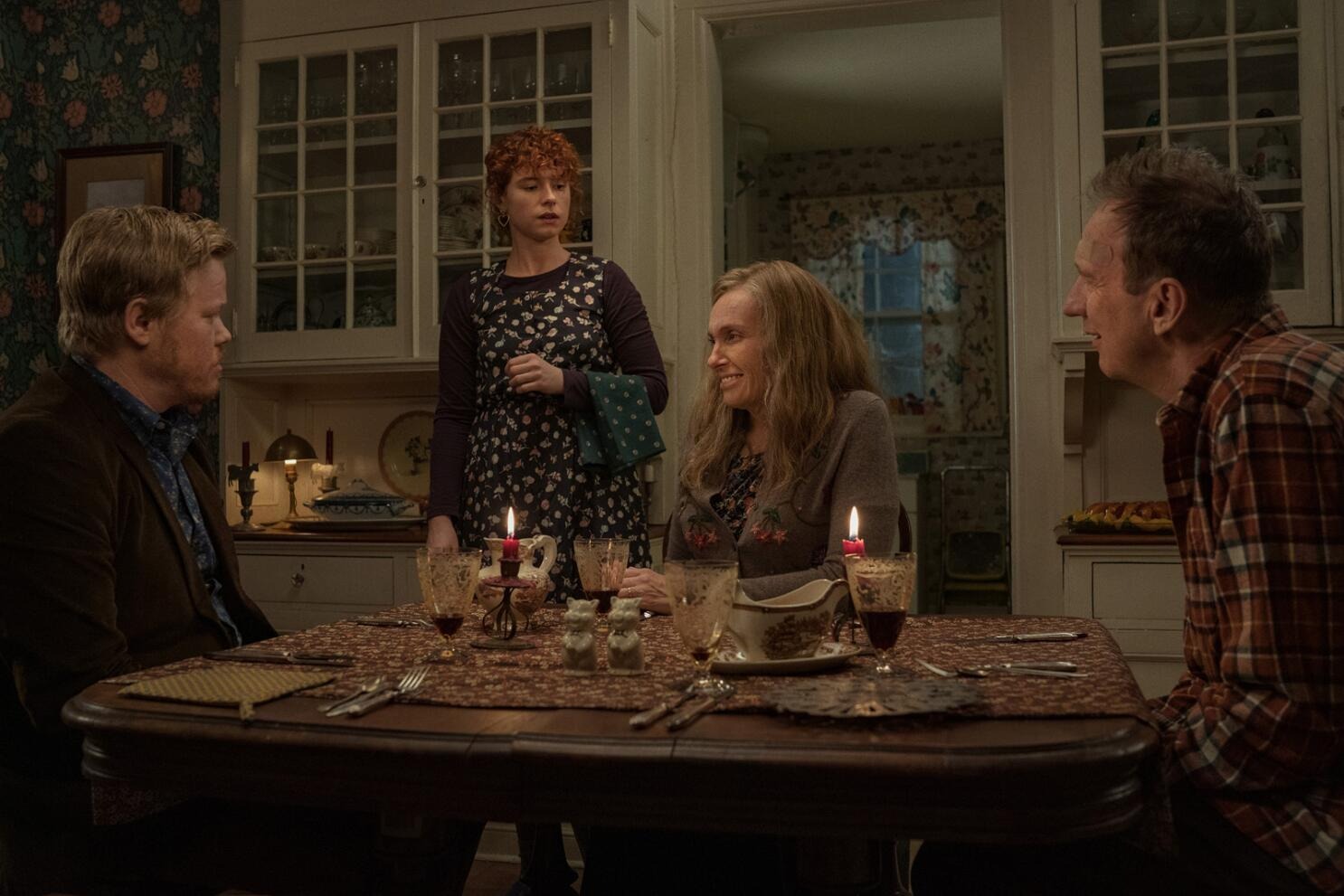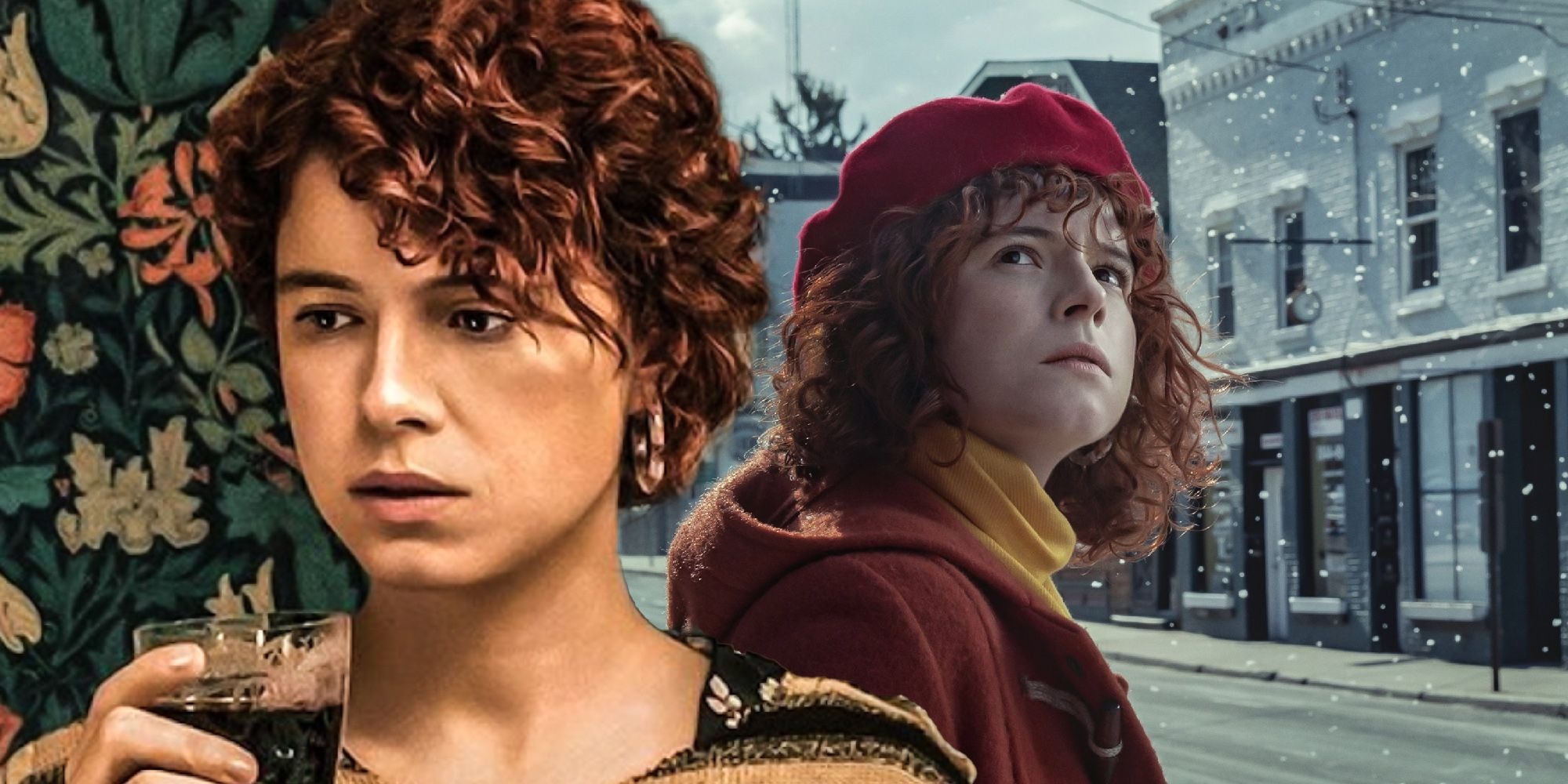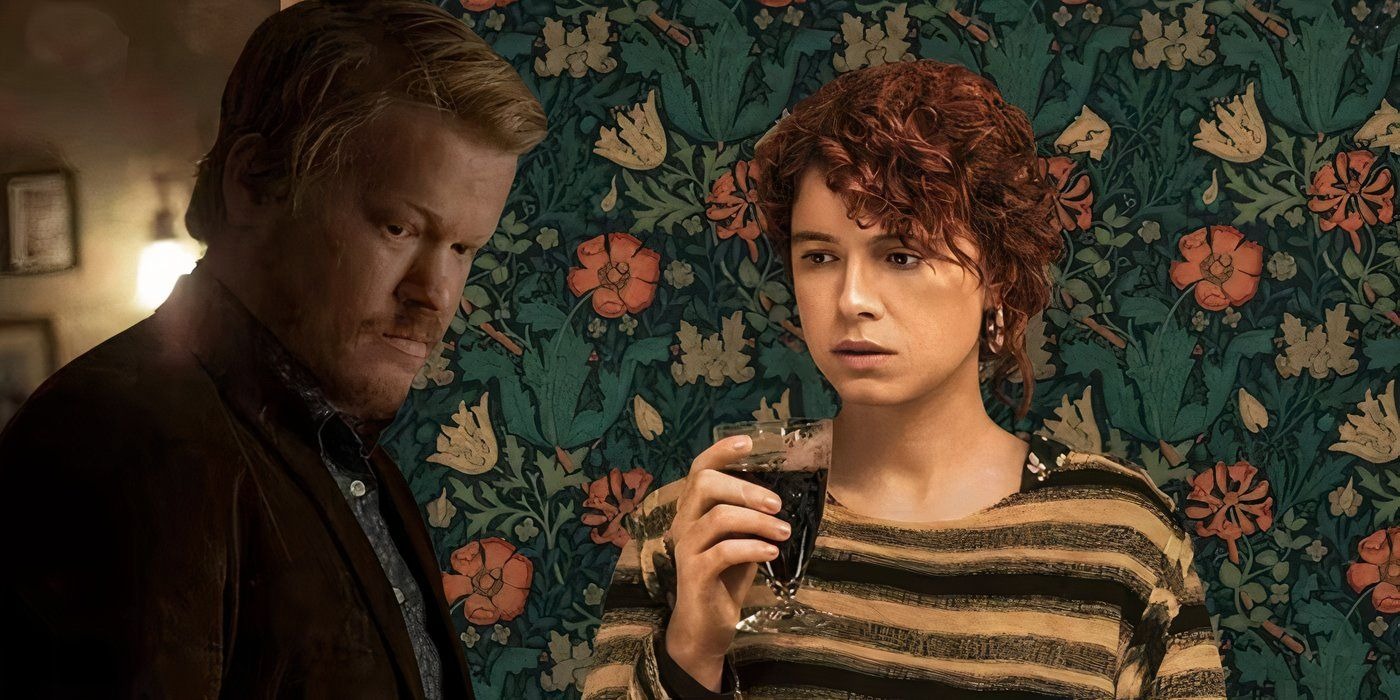Rather than becoming a typical breakup story, the female narrator’s perspective (played by Jessie Buckley) gradually reveals that she doesn’t exist. Her presence in the film is simply a part of Jake’s imagination—they are the same.
This becomes evident through different clues scattered across the movie. Her clothes are never consistent, her name changes frequently—Lucy, Louisa, Lucia, and so on. Her attitude also changes, sometimes acting like an ideal housewife, then switching to a formal visitor, and her profession keeps changing—physicist, gerontologist, waitress.

We find out she’s supposedly an artist, but the artwork she presents to Jake’s parents are pieces that Jake himself admires and has attempted to recreate in the basement. She also claims to be a poet, though the poem she recites comes straight from a book found in Jake’s room.
She even takes on the role of a film critic later on, quoting lines straight from Pauline Kael, whose collection of work Jake owns and reads. This female figure represents an ideal Jake has crafted in his mind about the kind of woman he could have had a relationship with—a woman he probably saw at a pub quiz and couldn’t stop thinking about.
The details of how they supposedly met aren’t fixed either. The narrator recalls their first meeting with a kind of dreamlike tone, laughing too hard while describing Jake’s intelligence and how clever his quiz team name, “Brezhnev’s Eyebrows,” was.
She also describes how Jake explained who Brezhnev was to her, giving the impression that Jake fantasized about a girlfriend who’s smart but still looks up to him as being smarter.
Eventually, the story of their meeting takes a different turn and aligns with a scene from a romantic comedy that the janitor character (played by Guy Boyd) happens to be watching. In this version, the narrator is a waitress and Jake is a customer—similar to the movie within the movie.
At one point on their drive home after visiting Jake’s parents, the narrator even morphs from Jessie Buckley into Colby Minifie, who plays the waitress from that film. Even inside his fantasy, Jake manages to imagine the relationship turning sour. The version of her that mirrors Pauline Kael makes him feel insecure.
She’s a feminist, and when he tries to joke using the lyrics of ‘Baby, It’s Cold Outside,’ they end up arguing. Though it seems like just one evening together, the different outfits suggest that the couple is reliving what seems to be a whole relationship compressed into one night.
This also shows Jake constantly shifting roles and ideas, both for himself and his imaginary partner. The tension hits a peak when Jake decides they must go to his old school just to throw away their unfinished ice cream. He leaves her in the car and heads inside, and that’s where things take another turn…
Jake and the Janitor
The connection between Jake and the janitor is that they are the same person. The film opens with scenes showing an empty home, accompanied by the narrator’s voice saying, “I’m thinking of ending things.” Initially, it appears like she’s contemplating breaking up with Jake.
But on a second viewing, it becomes clear that Jake—now an older man working as a janitor—is thinking of ending his life. In an early moment, we see the janitor looking out his window, repeating an odd phrase that later shows up in a voicemail the narrator receives.
In the book version, this is a much darker and more unsettling moment—the calls are coming from her number, hinting at how deeply internal everything is.
The names that flash on her phone, Louisa and Yvonne, both link to earlier elements: Louisa is what Jake’s parents call her, and Yvonne is the heroine of the film the janitor watches—she even appears briefly in the car.
Scenes of the janitor wandering through empty school corridors are scattered throughout the film. He sees students preparing for a play, watching them dance and perform. It’s only by the time the movie finishes that we fully grasp that Jake and the janitor are one person.
The narrator, too, is a mental construct, part of an imaginary world Jake has created.
Jake and His Parents
Although Jake’s parents existed, they are no longer alive. Based on the theory that the movie represents the final dream of an older Jake—now the janitor—we witness a drawn-out dinner where Jake is seen looking after his mother as her health worsens, eventually leading to her death.
His father is left grieving. The chair used by his mother later appears in the janitor’s apartment, and the initial scenes showing an empty house confirm that no one is left there.
The Janitor and the Narrator
After stepping out to discard the ice cream cups, Jake comes back convinced that someone is watching them. He insists on going to confront whoever it is, despite the narrator’s protests. He disappears inside the school and takes too long, so the narrator follows but can’t find him. Instead, she comes face to face with the janitor.
This scene provides a version of events that feels more grounded in reality. When the janitor asks her to describe Jake, she struggles. She says she had been out at a bar with her girlfriend, marking their anniversary, and that Jake was there too—but came off as a creep.
She even mentions that having a man nearby is often the only thing that wards off persistent strangers. She compares Jake to a mosquito bite from forty years ago—something too trivial to remember. This part of the film may not be any more real than what came before. It still exists within the janitor’s thoughts.
But as his thoughts become more serious about ending his life, he begins to imagine what may have actually happened—or perhaps a more tragic version of events, compared to the fantasy he had been clinging to.
This is also the first time the janitor and the narrator share space in the same scene, and she is allowed to speak for herself. Even though she still lives in Jake’s mind, this moment gives her a sense of self. She ends up holding the janitor before the scene changes.
The Dance in the School
Inside the school corridor, we watch ideal versions of Jake and the narrator dancing. Through this dance, Jake expresses the kind of life he had wished for—filled with romance, happiness, and eventually marriage. But then a make-believe version of the janitor joins the scene and kills off the idealized Jake.

What this shows is that the older Jake—the janitor—is still alive, but he’s consciously putting an end to the fantasy. He lets go of the narrator. That scene brings together beauty, grief, and a deep sense of regret.
The Animated Pig
We next see the janitor outside, crying in his vehicle. An animated pig covered in maggots appears and walks him back into the school building for his final moment. The pig ties back to the earlier mention of pigs on Jake’s family farm—pigs that were dying slowly as maggots consumed them from the inside.
This image represents how Jake feels emotionally like something is eating him up from within due to his depression. Here, the pig acts like a sort of guide, encouraging him to accept death.
In the film, the pig comes across as gentle, but in the novel, the maggot-eaten pigs symbolize Jake’s fear that even after ending his life, things might not stop, and he could continue to suffer.
Jake’s Musical Number
Jake’s love for musicals is mentioned earlier during the drive to the farm. The janitor also appears in scenes where students are rehearsing musical performances. After the pig takes him back into the building, he imagines his goodbye as an aged-up version of Jake, performed by Jesse Plemons rather than Guy Boyd.
In this fantasy, Jake stands on stage, accepting a fake award with an audience filled with older versions of his parents and the narrator. The stage design is based on Oklahoma!, which Jake is fond of.
But during this final act, he performs “Lonely Room,” a song sung by Jud, a disturbing character from Oklahoma! who tries to harm the lead female character and accidentally kills himself. This song reflects a life filled with yearning but never lived to its full potential.



